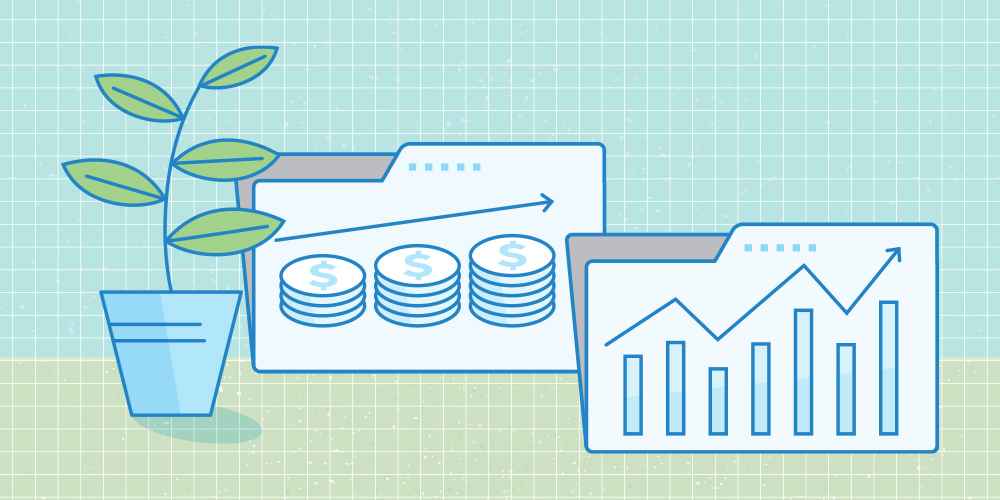GICs or market investing? Maybe you’re trying to decide which one is best for you at this time. They both have their charms.
Reliable, trustworthy, always there in the background, not flashy and available at an agreed upon time – that’s Guaranteed Investment Certificates (GICs).
Volatile, exciting, always elbowing its way into conversations when it rides another roller coaster or has a terrible or wonderful day – that’s the market, particularly stocks*.

Know your risk tolerance
Some people never want to lose a dollar, so they turn entirely away from the stock market. Others crave the potential for big or long-term gains, and they can stomach the uncertainty when markets churn. A lot has to do with your ability to handle risk. Market investments can be riskier than GICs because they aren’t guaranteed and you run the risk of losing money. But missing out on stock market returns might also be a risk you don’t want to take.
Investors who prefer the stock market may consider the money they’d make on interest in a GIC too low, especially when interest rates are very low. Other investors lean towards GICs because they see a safe haven, where their principal is guaranteed to be returned to them.
Servus GICs are low-risk investments that can fit strategically within your portfolio. They pay a set rate of return, offer various rates and terms, and can be purchased alone or as part of a registered plan. They require low minimum investment and are 100% guaranteed by the Credit Union Deposit Guarantee Corporation.
Generally, GICs provide a safer ride - one that’s guaranteed to return your investment and then some. While the stock market often promises the potential of bigger rewards.
But it doesn’t have to be one or the other in your investment portfolio. Once you determine your general risk tolerance, you might lean towards one or the other, but it’s important to know you don’t have to choose between them. You can opt for both of these investment options simultaneously.
Set your goals with timelines
In addition to risk tolerance, the thing to consider is your investment timeline, which can help steer your decisions.
Are you looking at a shorter time frame or a longer one? Are you planning to retire in five years or 20 years?
A GIC term can range from 30 days to five years until it matures, so you have some latitude in choosing when you’ll be able to access your money.
If you have a short-term goal of, say, buying a house within the next five years and you’re aiming to make at least the down payment, a GIC offers a safe place to park your money while gaining some interest.
Put that same amount of money in stocks for the same aim and you’re betting on your return being quite a bit more than what you’ve invested or, at the very least, the same. Of course, the risk is that it could drop significantly, too, as we have seen this year.
While the interest you earn with GICs generally keeps pace with inflation, stocks are difficult to predict, especially if you’re trying to cherry pick winners.
That’s why most people who invest in the stock market prefer to spread their choices out so they have diversity if one sector rises while another falls. There are different types of market investments with varying rates of risk. Buying individual stocks can be riskier (and possibly more rewarding in terms of return) whereas mutual funds and exchange-traded funds (ETFs) contain a basket of securities that spread out the risk.
If you’re looking at a long-term goal like retirement, markets tend to reward investors with inflation-beating rates of return. There might be some big ups and downs, such as during the recession of 2008 and the COVID pandemic, but historically stocks have rewarded those who’ve stayed invested over time.
Consider GICs as an anchor of sorts. They guarantee you’ll be getting the money you’ve invested and some more while you also gain peace of mind. Markets offer growth potential. Over the long term, they can allow you to build up a bigger nest egg.
Get the best of both worlds with diversification
Diversification is a strategy that mixes a variety of investments in your portfolio, which are made of different kinds of assets, allowing you to yield higher returns over time while lowering the risk of individual holdings.
GICs and market investments can both have a place in your diversified portfolio.
There are a number of GICs to choose from and, at Servus, your GIC may be included in our Profit Share® program so you can earn even more.
Market options are plentiful – you can invest in stocks through your employer’s retirement plan, Registered Retirement Savings Plan (RRSP), mutual funds* and a host of other vehicles.
With so many options, it's best to get expert advice. A Servus advisor can talk you through all the ways you can build your wealth or if you'd like to get started investing in GICs now, you can invest easily thought online banking.
*Mutual funds and other securities are offered through Aviso Wealth, a division of Aviso Financial Inc. Unless otherwise stated, mutual funds, other securities and cash balances are not covered by the Canada Deposit Insurance Corporation or by any other government deposit insurer that insures deposits in credit unions.

